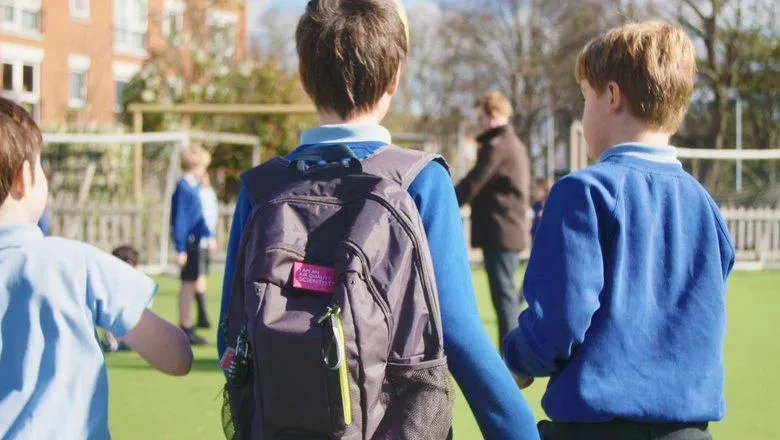19 March 2019
World's largest study to monitor air quality exposure of 250 children
A new study by King's scientists will monitor air quality exposure of 250 children on their way to school and in the classroom. The announcement was made today at Haimo Primary School in Greenwich by the Mayor of London, Sadiq Khan, who is funding the study.

Led by Dr Ben Barratt from the Environmental Research Group at King's, the study will use state-of-the-art toxic air monitoring backpacks developed by Dyson, to help monitor and better understand the levels of toxic air young Londoners are exposed to during their journeys to school and in the classroom.
250 pupils from five London primary schools, situated across five boroughs (Southwark, Richmond, Greenwich, Haringey and Hammersmith and Fulham) will take part in the project, wearing specially adapted backpacks to and from school for a week.
Weighing just over 1kg, the sensors fit into lightweight bags and measure particulate matter (PM2.5 and PM10) and nitrogen dioxide (NO2) levels. The children involved will use the backpacks like a normal bag (the monitor takes up one pocket, leaving plenty of room for school equipment), allowing the monitors to record pollutant levels on each child’s journey to school and throughout the school day.
The data from this study will allow King’s scientists to analyse at which point of their journey to school (or which part of their school day) children are exposed to the most pollution. They will also be able to the compare the exposure of children who have similar journeys but take different routes and travel modes and then make recommendations of how children can reduce their exposure in future.
Dr Ben Barratt from King’s said: “Air pollution has been found to restrict lung growth in children. Low lung function in childhood can persist into adulthood and is often associated with other health problems including chronic obstructive lung disease in later life.
"Analysing the impact of air pollution and providing information to our local, national and international communities is a core component of King’s civic responsibility. By monitoring the air that children breathe on the journey to and from school, we will gain a better understanding of which pollutants are the most harmful and where they are coming from, helping us to support effective improvements in public health.”
The Mayor of London, Sadiq Khan said: “It remains a shameful fact that London's toxic air is harming the lung growth and health of our young children, and City Hall is determined to do everything in our power to protect them.
“An issue this large and complex requires bold and innovative action to protect future generations and ensure our children inherit cleaner, healthier air. I’m proud that we’re able to launch world leading studies like this which will help us find new ways to reduce children’s exposure to toxic air. I hope the success of this scheme will act as a blueprint for cities around the world as they battle their own toxic air emergencies.
“The health of London’s children is key to everything we do to improve air quality. We’ve already conducted air quality audits at dozens of schools and nurseries across London,resulting in positive changes that are helping reduce pollution and clean the air for thousands of pupils. But alongside these measures, we need strong action, I will continue to prioritise the health of all Londoners with a range of strong measures including cleaning up the bus fleet, funding a scrappage scheme for micro-businesses to remove the most polluting vans and, next month, the launch of the world’s first Ultra Low Emission Zone in the central London Congestion Charge area. But we can't win this battle without more help from the Government, who are still failing to take this problem seriously and offer the support London needs to tackle this public health crisis.”
The new sensors have been developed by Dyson engineers in co-operation with King’s as part of the Mayor’s Breathe London project – launched in January.
Jessica Le Dinh, Category Intelligence Engineer, Dyson, said: “Our engineers have been researching clean air technologies for over two decades. Our team of experts applied their leading knowledge to develop intelligent sensors, compact enough to fit in children’s backpacks.
"Children can take up to 30,000 breaths a day. Their lungs are still developing, which makes them vulnerable to air pollution. City air can contain potentially harmful pollutants – including nitrogen dioxide and soot-based particulate matter. That’s why this study is so vital. It will help us monitor exactly what our children are exposed to, to inform effective solutions.”
